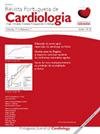Recommendations for the use of natriuretic peptides for early diagnosis of heart disease in patients with diabetes: A consensus report by SPEDM, SPC, NEDM-SPMI and APMGF
IF 1.6
4区 医学
Q3 CARDIAC & CARDIOVASCULAR SYSTEMS
引用次数: 0
Abstract
Diabetes mellitus is a significant risk factor for the development of heart disease (HD), with heart failure (HF) being one of the early manifestations of the disease in this population. The diagnostic process is challenging and contributes to a significant number of undiagnosed cases of HD among individuals with diabetes. This is largely due to the non-specific nature of symptoms and signs in the initial stages of disease, making early detection elusive. Timely identification and prevention of HD in patients with diabetes have the potential to significantly improve patient prognosis and alleviate the growing burden of this population on the national healthcare system.
Natriuretic peptides (BNP and NT-proBNP) have been recognized as reliable, cost-effective biomarkers for detecting HD and can be further used as risk assessment biomarkers in asymptomatic patients. Despite being recommended in several European and American guidelines to rule-out and rule-in HF, the routine use of these biomarkers for the diagnosis of HDs in patients with diabetes has only recently been proposed by the American Diabetes Association (ADA) and has not yet been implemented in Portugal. Therefore, a multidisciplinary panel of experts from four medical societies, the Portuguese Society of Endocrinology, Diabetes and Metabolism, the Portuguese Society of Cardiology, the Diabetes Study Group from the Portuguese Society of Internal Medicine and the Portuguese Association of Family Medicine were convened to discuss and establish consensus recommendations for natriuretic peptide screening in patients with diabetes and its integration into routine diabetes management protocols.
This manuscript draws on the consensus recommendations from four Portuguese medical societies, offering clear guidance on natriuretic peptides use tailored to Portuguese clinical practice. Accordingly, this consensus advises the use of NT-proBNP analysis for all patients with diabetes aged 50 years and older, or under 50 if they have risk factors and/or comorbidities. Adjusted rule-out and rule-in values for age, sex and risk factors are provided. NT-proBNP levels above 125 pg/mL should prompt additional testing and cardiovascular investigation. Routine evaluation every two to three years for low-risk patients and annually for high-risk patients is proposed when NT-proBNP is below 125 pg/mL and in the absence of suspected heart disease.
关于使用钠尿肽早期诊断糖尿病患者心脏病的建议:SPEDM、SPC、NEDM-SPMI 和 APMGF 的共识报告。
糖尿病是心脏病(HD)的一个重要危险因素,而心力衰竭(HF)则是这一人群中心脏病的早期表现之一。诊断过程极具挑战性,导致糖尿病患者中有大量 HD 病例未得到诊断。这主要是由于疾病初期的症状和体征并无特异性,因此难以及早发现。及时发现和预防糖尿病患者的 HD 有可能显著改善患者的预后,并减轻这一人群给国家医疗系统带来的日益沉重的负担。钠尿肽(BNP 和 NT-proBNP)已被认为是检测 HD 的可靠、经济的生物标志物,并可进一步用作无症状患者的风险评估生物标志物。尽管欧洲和美国的一些指南推荐使用这些生物标志物来排除和诊断心房颤动,但美国糖尿病协会(ADA)最近才提出常规使用这些生物标志物来诊断糖尿病患者的心房颤动,而且葡萄牙尚未实施。因此,由葡萄牙内分泌、糖尿病和代谢学会、葡萄牙心脏病学杂志、葡萄牙内科医学会糖尿病研究小组和葡萄牙家庭医学协会这四个医学会的专家组成的多学科小组召开了会议,讨论并制定了糖尿病患者钠尿肽筛查的共识建议,并将其纳入常规糖尿病管理方案。本手稿借鉴了葡萄牙四个医学协会的共识建议,针对葡萄牙的临床实践提供了使用钠尿肽的明确指导。因此,该共识建议对所有 50 岁及以上的糖尿病患者进行 NT-proBNP 分析,如果糖尿病患者有风险因素和/或合并症,则对 50 岁以下的患者进行 NT-proBNP 分析。提供了根据年龄、性别和危险因素调整后的排除值和纳入值。NT-proBNP水平超过125 pg/mL时,应进行额外的检测和心血管检查。如果 NT-proBNP 低于 125 pg/mL,且没有疑似心脏病,建议对低风险患者每两到三年进行一次常规评估,对高风险患者每年进行一次常规评估。
本文章由计算机程序翻译,如有差异,请以英文原文为准。
求助全文
约1分钟内获得全文
求助全文
来源期刊

Revista Portuguesa De Cardiologia
CARDIAC & CARDIOVASCULAR SYSTEMS-
CiteScore
2.70
自引率
22.20%
发文量
205
审稿时长
54 days
期刊介绍:
The Portuguese Journal of Cardiology, the official journal of the Portuguese Society of Cardiology, was founded in 1982 with the aim of keeping Portuguese cardiologists informed through the publication of scientific articles on areas such as arrhythmology and electrophysiology, cardiovascular surgery, intensive care, coronary artery disease, cardiovascular imaging, hypertension, heart failure and cardiovascular prevention. The Journal is a monthly publication with high standards of quality in terms of scientific content and production. Since 1999 it has been published in English as well as Portuguese, which has widened its readership abroad. It is distributed to all members of the Portuguese Societies of Cardiology, Internal Medicine, Pneumology and Cardiothoracic Surgery, as well as to leading non-Portuguese cardiologists and to virtually all cardiology societies worldwide. It has been referred in Medline since 1987.
 求助内容:
求助内容: 应助结果提醒方式:
应助结果提醒方式:


